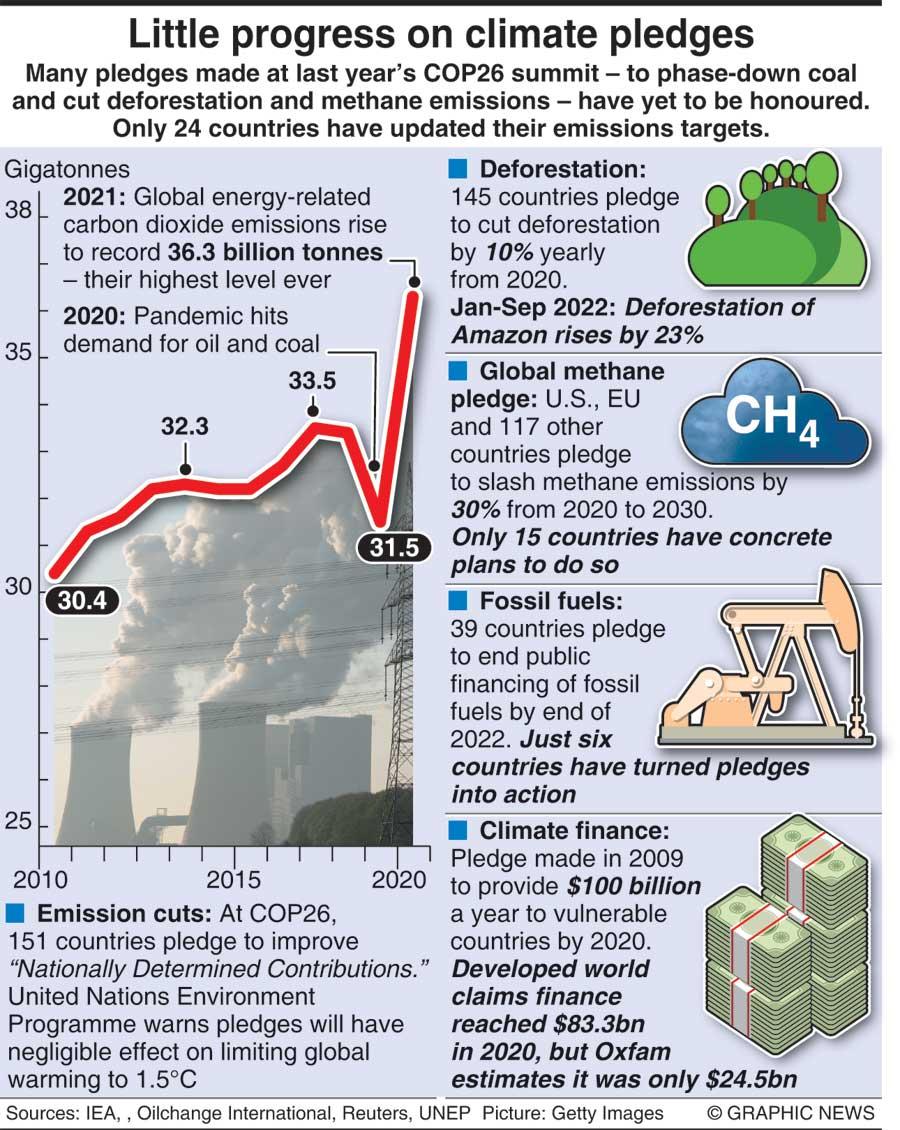11 Nov 2022 - {{hitsCtrl.values.hits}}
Yet another high-profile climate summit and yet another half-hearted attempt by big-time polluters and rich nations to put the world on a war footing to face the biggest challenge humanity has ever faced – the existential threat from climate change. The enemy is none but ourselves. It is we who caused harm to the environment and it is we who now face its repercussions which will last for generations to come or till our living planet finally dies a premature death.
has ever faced – the existential threat from climate change. The enemy is none but ourselves. It is we who caused harm to the environment and it is we who now face its repercussions which will last for generations to come or till our living planet finally dies a premature death.
Tomorrow’s children will curse us for our failure to tackle climate change with the seriousness it deserves.
There are no easy solutions to climate change. Solutions are costly and time-consuming and, therefore, require financial commitments, sacrifices, and concerted efforts.
The irony is that at this week’s COP27, also known as the Conference of the Parties or the United Nations Climate Change Conference, world leaders acknowledged the urgency to find at least a temporary solution, but they put the pleas they make to the backburner and get on with their usual climate-destroying economic pursuits.
At the conference, developing countries, which are paying a huge price for the climate crimes of developed countries and fast-developing countries, urged the rich nations to commit more funds to mitigate the adverse effects of climate change. They pleaded for a financial lifeline to cushion the economic losses they are compelled to suffer by abandoning fossil-fuel-driven development strategies and instead adopting costly green development strategies.
Poor developing countries are like frontline soldiers. They suffer the brunt of climate-change devastations. Recently, Pakistan suffered a climate calamity in the form of a deluge that killed some 1.500 people, displaced 33 million people, and destroyed houses, schools, bridges, and other infrastructure the country had painstakingly built with its hard-earned money and funds borrowed from rich nations and donor agencies. According to a conservative estimate, the country requires at least 36 billion dollars to rebuild the damaged infrastructure. The socio-economic cost the people suffered is inestimable. Climate experts warn such disasters will become more frequent if global warming continues at the current rate.
Also on the frontline is Sri Lanka, one of the most climate-change-vulnerable nations. Data indicate that floods accompanied by landslides during the two monsoon periods are increasingly becoming common. The Sri Lankan government, caught in an economic whirlpool, has neither the wherewithal to undertake projects to mitigate the effects of extreme weather nor the will to adopt a no-nonsense attitude to wield the whip on climate criminals, who turn out to be politicians or their cronies.
As a party to the 2016 Paris Climate Agreement, Sri Lanka is required to declare its Nationally Determined Contribution to climate-change mitigation efforts, outlining how it addresses its vulnerability to climate change in line with its commitments to a low-carbon pathway through sustainable development efforts. Yet, its forest cover continues to dwindle due to human action. According to Global Forest Watch, an online platform that provides data and tools for monitoring forests, Sri Lanka had 3.53Mha of natural forest, extending over 54% of its land area in 2010. In 2021, it lost 13.3 kha of natural forest, which is equivalent to accruing 5.01 metric tonnes of CO₂ emissions. That is indeed a large area enough to fill more than 32,000 football fields.
Sri Lanka’s President Ranil Wickremesinghe, addressing the COP27 summit on Tuesday, said unbridled industrialisation of the developed countries was the root cause of climate change, leaving the poor to suffer the consequences. He said the problems facing poor countries were augmented due to the absence of adequate funding. He was echoing the views of almost all developing countries, whose voice counts less now in the absence of a collective body to represent them. During the cold war period when the Non-aligned Movement represented the developing nations, they had not only their say but their way at international forums such as the Law of the Sea Conference and the world trade talks.
But developed countries -- some of whom became rich by plundering the wealth of their colonies, showing no concern for the harm they were causing to the environment -- often dishonor or under-fulfill their pledges. The money that should have gone into global action aimed at curtailing global warming has been excessively spent by most developed nations on destructive purposes – promoting wars and investing in costly weapons.
At the COP27 summit, though world leaders identified the Ukraine war as a factor that threatened global food security, hardly anyone talked about how wars undermine global efforts to deal with climate change. The war in Ukraine, for instance, is everything climate activists do not want a global conflict to be. The war, on the one hand, is draining the disposable income of the rich nations of the West. They channel billions of dollars to the war effort in support of Ukraine. On the other, it has triggered a drive to increase oil and natural gas production, adding to the environmental harm fossil fuel is causing.
With US and Western sanctions curtailing Russia’s energy exports, the US has pledged the energy-starved European nations that it would increase production to meet the shortfall.
From January to August this year, the war aid to Ukraine from Western nations and their allies is more than US$ 84.2 billion, according to the Kiel Institute, an independent think tank based in Germany. By now, it may have even topped US$ 100 billion, the amount the rich nations, which are mostly responsible for global warming, pledged in 2009 to make available annually till 2020 for developing nations to deal with the consequences of climate change. The commitment had still not been met, developing countries complained at this week’s COP27 summit.
In response, the United States’ special presidential climate envoy John Kerry told the conference, “No government in the world has enough money to affect the transition… The entity that could help the most is the private sector with the right structure.”
He was only confirming the rich nations’ policy of giving preference to wars and destructive arsenals, including nuclear weapons, over the world’s most pressing problem – climate change.
It is nothing but mixed-up priorities or even a crime against humanity if rich nations spend hundreds of billions of dollars to keep the war flames up instead of diverting the money to save the planet so that we all can breathe clean air, live a healthy life, and ensure food security to all while reducing or eliminating the use of fossil fuel and adopting a green development policy.
At this week’s summit, the UN Secretary-General warned that “the world is on a highway to climate hell with our foot on the accelerator”, but it appears such a warning would not shake the conscience of the rich nations to end wars, reduce defence expenditure and channel the money saved towards protecting the planet.

10 Jan 2025 20 minute ago
10 Jan 2025 40 minute ago
10 Jan 2025 2 hours ago
10 Jan 2025 2 hours ago
10 Jan 2025 3 hours ago